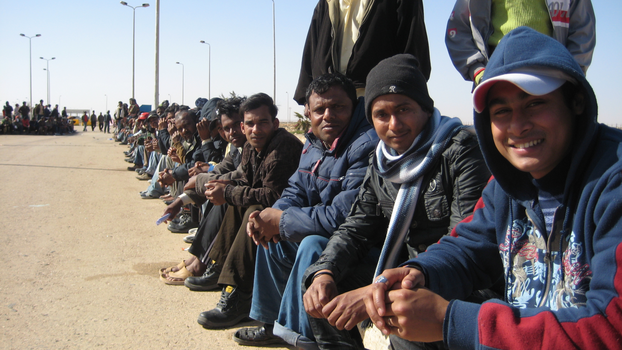
In blatant violation of international refugee and human rights conventions, Egyptian authorities continue their crackdown against refugees and people on the move. While deportations of Eritrean nationals have apparently been expanded significantly since 2021, countless people on the move are currently detained in Egypt in disastrous conditions and without access to legal counsel.
Sofian Philip Naceur is a project manager at the Rosa Luxemburg Foundation’s North Africa Office and works as a freelance journalist.
For years, criticism of Egypt’s systematic human rights crimes against its own population has primarily been voiced behind closed doors by European governments. Human rights violations against Egypt-based refugees, however, are barely a matter of concern at a diplomatic level. Cairo has a de facto free hand in dealing with refugees — after all, both Egypt and European states have a vital interest in maintaining and even expanding the border control regime in the region.
The Egyptian government is now responding to an EU demand by drafting an asylum law. But by doing so, Cairo is also pursuing its own aims. “Egypt is by no means a passive object of the EU’s border externalization”, Gerda Heck, a professor at the American University in Cairo (AUC), tells the Rosa Luxemburg Foundation. On the border to Libya, for example, its own security interests play a considerable role.
It is equally important for the regime to exert a maximum degree of control over its borders and the people living in the country — whether Egyptian or not — namely without interference from the UN or other actors. This is one reason why immigrants are often kept in an all-embracing state of uncertainty.
Thousands or even tens of thousands of people are arrested at Egypt’s borders every year and often held indefinitely in administrative detention. While the military infrequently publishes figures on people arrested at the borders, Egypt is a downright black box regarding deportations. Official statistics do not exist, and neither civil society nor the media are able to grasp official practices in their entirety, given the sensitivity of the issue and the lack of transparency by the Ministry of Interior and the army.
Nevertheless, this report, based on more than 50 interviews conducted between September 2020 and March 2022, attempts to outline some elements of the Egyptian military regime’s migration and border control policy, and to present a more nuanced picture in contrast to the image of a supposedly compliant Egypt that acts only at the behest of Europe.